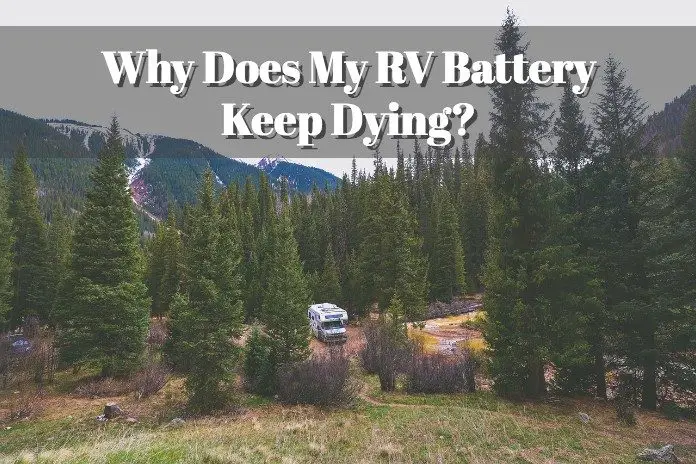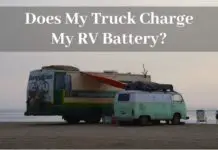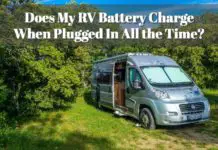
You’ve been looking forward to this vacation for a long time. You planned everything by crossing your T’s and dotting your I’s. You left nothing to chance as you didn’t want to be running back and forth from your campsite and the nearest shopping center.
You prepared your family well in advance. They know what to do. Now it’s just a matter of kicking back, relaxing, and reading a book to the tunes that only mother nature can give best.
Alas! Your lights cut out! You sit up in your deck chair or hammock. Your bewilderment is worthy of being turned into a meme. You turn on the engine to sort out the problem, but it keeps happening.
So, you start wondering, why is it that the battery keeps going dead in my camper? The answer is as simple as your battery doesn’t have charge. That may seem like an answer devoid of oomph but that’s exactly what it is; nothing special. How it happened though, is what is worthy of investigating.
Even if you make sure you are recharging the battery, there are a variety of reasons as to why it is dying out on you, severally. Let’s take a look at some of the most common.
4 Significant Reasons to Die Your RV Battery
1. Sulfation
A lead acid battery will use sulfuric acid as the electrolyte. You can think of it as the power bank. During normal operation, or discharging, the sulfuric acid will be depleted and will start to turn to water. The electrolyte contains sulfate and hydrogen ions which are negatively charged. When current is flowing, the negative ions will move to the negative plate and give up their charge.
The charge will flow to the electronic device and back into the battery on the positive side. The ions will receive charge at the positive plate of the battery. As this is happening, sulfate crystals from the battery begin to coat the lead plates where the reaction is taking place. This has the effect of reducing the surface where reactions take place.
This is why a battery may give out a fixed voltage when it starts out but then the voltage will reduce with time. Now, when the battery is recharged, this process is reversed until the sulfuric acid is reconstituted.
Now, the problems begin when the battery is discharged over a long period of time and no charge is fed back into it. The sulfate crystals that coated the negative plate will continue growing, thereby reducing the amount of charge flowing out of the battery. The more the discharge continues, the more the coating grows, which will cause the sulfation to become permanent.
This is how batteries are ruined by excessive depletion. They need to be charged in a timely fashion. It doesn’t matter whether the battery is new of has lasted for seven years.
2. Parasitic Loads
Depleting your battery is terrible for its life, and charging it regularly is important, even if it is in storage. Even though you may adhere to charging schedules the amount of electronics you have connected to it could still be a problem. This is known as parasitic drain.
In your RV, you can have many uses for electronics in the same way as you do inside your home. Things like clock radios, gas leak monitors, smoke detectors, the TV antenna booster or even a 12-volt bulb are all hooked up to your battery.
Even if you’re sure you switched off these appliances, power could still be drawn away from the battery by these appliances. This is because some of these appliances need to maintain a memory of the inbuilt functions and thus need power to maintain these instructions in memory.
Such things may not really be a problem for your car as you recharge your car’s battery on a regular basis. For an RV though, recharging doesn’t happen often and this leads to power drain. Remember the first point, sulfation? This sets in when the battery voltage level drops below 12.5 volts. If not recharging happens, that battery will be ruined.
3. Battery Self-Discharge
The battery just has one job; store power and release it to you whenever you need it. Why then would it go losing power when it’s not in use? Well, that’s the chemistry of the electrolyte in action. A stored battery will lose at least one percent of its charge daily.
Also, the aforementioned connected electronics help the battery in its efforts to self-discharge. They will draw anywhere from half an ampere to one in a day. When you combine this power draw with the rate at which the battery is discharging power by itself, your battery will have lost half of its total charge if it is left unattended.
The third factor here is temperature. The battery relies on chemical processes to provide power. Chemical processes are subject to changes in temperature; increased reaction rate when temperatures are higher, reduced reaction rate when temperatures are low. If you leave your battery unattended in hot weather conditions, the battery will discharge much faster than it would in cold weather.
4. Your Battery Overcharged
Yes, head scratch moment. An overcharged battery having died out because it didn’t have enough charge; what kind of witchcraft is this? Let’s start from here…
Your RV will come with a battery charger that you can use to recharge your batteries. Nowadays, most RV chargers are three stage chargers.
• Stage One involves charging the battery rapidly until it reaches about 90 percent of its potential charge capacity.
• Stage Two involves charging the remaining 10 percent of the battery capacity. This is called absorption charging and is used to prevent serious issues such as gas formation in the battery and loss of battery water.
• Stage Three involves is known as maintenance charging, or float charge. The purpose of this is to keep the battery fully charged.
Older and faulty chargers will fail at the third stage. The goal is to keep the battery fully charged but most may not have this feature. Instead they will provide power to the battery at more than 13 volts. This voltage is too high and will result in the electrolyte boiling off. This means an early retirement for your battery.
This is why maintaining your battery is important. This involves adding battery water and sometimes electrolyte, and also checking no other damage has been done.
Sources:
1. The Super Secret Working of a Lead Acid Battery Explained – BatteryStuff.vom
2. NOT ANOTHER DEAD RV BATTERY – Go RVing





